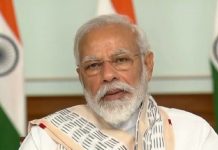 US President Donald Trump, perhaps, believes that even today we live in an America-driven world though the situation has changed considerably. Of course, the US continues to remain the most influential country having the most powerful armed forces and theworld’s largest economy, but it no longer has the capacity to intimidate any country that shows courage to defy its dictates, reasonable or otherwise. The latest proof of the changed reality is available in Turkey’s rejection of President Trump’s demand for release of a US citizen, a pastor, facing terrorism charges over a failed military coup to overthrow Turkish President Recep Tayyip Erdogan on July 15, 2016.
US President Donald Trump, perhaps, believes that even today we live in an America-driven world though the situation has changed considerably. Of course, the US continues to remain the most influential country having the most powerful armed forces and theworld’s largest economy, but it no longer has the capacity to intimidate any country that shows courage to defy its dictates, reasonable or otherwise. The latest proof of the changed reality is available in Turkey’s rejection of President Trump’s demand for release of a US citizen, a pastor, facing terrorism charges over a failed military coup to overthrow Turkish President Recep Tayyip Erdogan on July 15, 2016.
Turkey has been arguing that the law of the land must be allowed to take its own course, but the US administration is not convinced. The US is adamant that the pastor, Andrew Brunson, a missionary living in Turkey for 24 years, must be released forthwith as he has allegedly been framed in the case of terrorism with “trumped-up charges”. However, President Erdogan’s stand is that the legal proceedings launched against Brunson cannot be snapped simply because the US feels the pastor is innocent.
Despite denials by Brunson and his family members, the case against him is claimed to have been instituted on the basis of proof that Brunson has allegedly strong links with a rebel Turkish cleric having political ambitions, Fathullah Gulen. The unsuccessful July 2016 military coup in Turkey was found to have been carried out by Gulenists in the Turkish armed forces. However, no one knows how the Turkish intelligence network failed to smell what had been cooking there for a long period. The anti-Erdogan plot could not succeed to achieve the desired objective because the Turkish President has a strong following among the masses. Followers of his Justice and Development Party (AKP, for short) came out in large numbers to fill the streets in various cities, defeating the Gulenists swiftly. Over 50,000 saboteurs were taken to task by the Erdogan regime to send across the message that a democratically elected government cannot be overthrown in this manner.
However, Turkey as a nation continues to suffer because of the indirect US support to the Gulenists. It is believed that the US wants Gulen (who lives in a US city) to replace Erdogan as the ruler of modern Turkey. The Trump administration has refused to recognise the fact that both countries are NATO (North Atlantic Treaty Organisation) allies. The US under Trump has shown that it can go to any extent to intimidate even a long-time and strategically important ally.
President Trump claims that he and Erdogan had reached an informal agreement on the release of the US pastor and some other foreign detainees during their private discussion at a recent NATO summit at Brussels. In return, Erdogan, according to Trump, wanted the US President to help him in securing the release of a Turkish woman prisoner from an Israeli jail. Now that the woman has been released at the behest of Trump, Erdogan too should have acted to honour “the agreement”, claims Trump.
Erdogan, however, denies the “agreement”, yet he has shifted Brunson from jail to put him under house arrest. But this is not acceptable to Trump. He wants Brunson to be released immediately as the latter belongs to the evangelical community in the US, a significant Republican Party vote bank. Brunson has been initially jailed for 20 months and his case is still in a court. If finally convicted, he faces 35 years in prison.
A conservative Christian organisation called the American Center for Law and Justice has entered the scene in support of the drive to get Brunson freed. This suits Trump, who has “prioritised the freedom of US citizens as part of his diplomacy,” according to a diplomatic affairs expert. With a view to punishing Turkey, the US has imposed on it punitive economic sanctions and tariffs, resulting in the Turkish currency, the lira, losing around 40 per cent of its value in the international currency market. The “economic war” by the US against Turkey is unlikely to end in the near future which is a major cause for global concern.
The Brunson case is not about the fate of just one individual. It has become a major prestige issue for Trump and may seriously damage his image in the evangelical community and other right-wing Americans. This is, however, only one of the factors why the “economic war” on Turkey has been launched by the US by imposing sanctions and doubling tariffs on steel and aluminium. The other factors are also equally serious. President Erdogan’s West Asian (Middle East) policy has very little to cheer the US about. Erdogan has refused to justify US help to Kurdish YPG allies, whose scheme of things for the region doesn’t suit Turkey. He has outrightly ignored the US reservations against the Turkish decision to buy Russian S-400 missile system. The Turkish President has made it clear that he cannot take any step which goes against the larger Turkish interests. That is why he ignored the US sanctions against Iran imposed after Washington’s unilateral withdrawal from the international deal reached over Teheran’s nuclear programme. Turkey has declared that it will continue to import Iranian oil and gas irrespective of Washington’s threats to punish any country which does business with Iran.
Contrary to the US stand on a tiny but rich Arab nation, Qatar, Turkey has stationed a large number of its troops to provide fool-proof security to the rulers in Doha. This is resented by Saudi Arabia, the closest US ally in the West Asian region. In the case of the Syrian crisis, too, Turkey under Erdogan has been providing all kinds ofsupport to the beleaguered Syrian ruler, Bashar Al-Assad, whereas the US favours a regime change as desired by Saudi Arabia. In fact, Riyadh assisted by Washington has been militarily engaged in Syria in support of the anti-Assad forces. Turkey has been on the opposite side along with Russia and Iran to ensure that the Assad regime regains full control over Syria.
But the relations between the US and Turkey had not taken the turn as seen today if the Brunson factor had not come into the picture in a big way, threatening the Republican Party’s following among the rightists in the US. Both countries are preparing to face elections in the coming months; the US Congressional elections are due to be held in November and Turkey has its municipal elections scheduled for March next year. Erdogan cannot afford to be seen as having succumbed to the US pressure to take a decision on the Brunson case, yet to be finally decided by the court.
Experts have been expressing the view that the problem can be handled diplomatically to the satisfaction of both sides. Economically coercive tactics, as Trump has resorted to, will only further complicate the matter. Turkey is the second biggest NATO ally of the US and it is integrated with the European Union countries in such a way that weakening the Turkish economy too much, though not possible as it appears, may destabilise many European economies also. Interestingly, neither Erdogan nor any of his ministers have directly assailed Trump for his anti-Ankara drive. But they may go to that extent too in view of the sharp impact the steadily weakening lira is having on the Turkish economy. That situation can lead to shaking NATO from its very foundations. Then Turkey may move closer to Russia to safeguard its national interests. How NATO remains intact under such circumstances will be interesting to watch.
letters@tehelka.com












